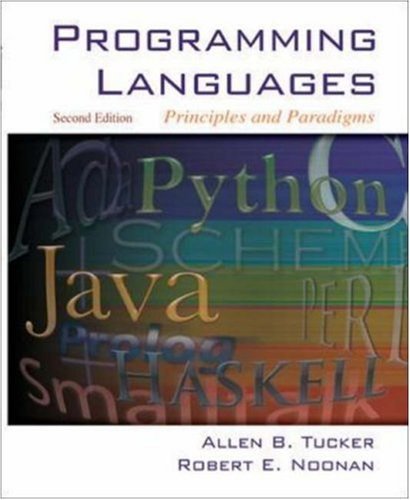|
Course Outline
|
Learning Goals:
Even after 5 years:
-
Know:
- The building blocks of language design.
- Diverging paradigms of languages: their differences and philosophies.
-
Be able to do:
- Design and implement an interpreter for a C-like language.
- Choose an "appropriate" language for a given problem.
- Examples of these paradigms are imperative (e.g., C),
object-oriented (e.g., Ruby, C++, Java, Python), functional
(e.g., Haskell), etc. Also
covered is how some of these paradigms are used in web
programming (e.g., Ruby on Rails).
-
Find value in:
- Convergence of design principles but divergence of language paradigms!
- What goes behind the scene at various stages of your coding.

Evaluation:
-
20% Points: Exams.Two
brief
(around 45 minutes) in-class exams.
Each exam carries 10%.
-
50% Points: Summative assessment: There will be several
programming assignments.
These assignments will carry different weights depending on the
difficulty level.
-
30% Points: Formative assessment and class participation: This includes formative assignments, attendance, and active class participation. Taking handwritten class notes is highly recommended for its many benefits.
Students will report the status of their note taking at the beginning of the two exams.
-
Points to letter grade conversion:
94% A, 90% A-, 85% B+, 80% B, 75% B-, 70% C+, 65% C, 60% C-, 55% D,
below 55% F
|
Programming Assignments:
|
Late Policy:
|
Software Installation:
|
Outline of Topics:
| Week |
Topics |
Reading |
Notes, Slides, Video |
| 1 (1/22) |
Introduction |
Ch 1
|
1.
Slides- Intro
2. Links:
Tiobe Index of PL
PL in big data
Video on Ada Lovelace
Bjarne Stroustrup video |
| 2 (1/27, 1/29) |
Syntax |
Ch 2 |
Slides- Syntax |
| 3 (2/3, 2/5) |
Syntax (cont.)
|
Ch 2 |
EBNF of C++ (Canvas)
|
| 4 (2/10, 2/12) |
1. Lexical analysis
2. Finite state automata: NFA and DFA
Project 1 out
|
Ch 3
|
1. Slides- Lexical Analysis
2. Video: NFA -> DFA
|
| 5 (2/17, 2/19) |
Syntactic analysis & parsing algorithms
|
1. Ch 3
2. Handout: Finite state automata - Scott (Canvas)
3. Handout: left recursion and left factoring (Canvas)
|
Slides- Syntactic Analysis
|
| 6 (2/24, 2/26) |
Parsing algorithms (continued)
Project 2 out
|
|
1. LL(1) parser generator
2. Prof. Irfan's class notes on LL(1) parsing
|
| 7 (3/3, 3/5) |
Names
Exam 1 on 3/3
|
Ch 4 |
Slides- Names |
| Spring Break |
|
|
|
| 8 (3/24, 3/26) |
Types
|
Ch 5, 6 |
Slides- Types
|
| 9 (3/31, 4/2) |
1. Types (continued)
2. Semantics and semantic analysis
Project 3 out
|
Ch 7, 8 |
Slides- Semantics
|
| 10 (4/7, 4/9) |
Functions & memory management
|
Ch 9, 11 |
1.
Slides- Functions & Memory Management
2. Heap in Python: Overview, more details
3. Heap in Java: Oracle blog
|
| 11 (4/14, 4/16) |
1. Functions & memory management (cont.)
2. Imperative vs Object-Oriented PL
3. OOP paradigm: Ruby
|
|
1.
Slides- OOP
2. Interview of Larry Wall (Designer of
Perl)
|
| 12 (4/21, 4/23) |
OOP paradigm: Ruby
Exam 2 on 4/21 4/23
|
|
Slides- Ruby
|
| 13 (4/28, 4/30) |
Web programming - Ruby on Rails
| |
Slides- Rails |
| 14 (5/5, 5/7) |
Functional programming - Haskell
Project 4 out
|
|
Slides- Haskell |
|
Github Policy:
Making assignment solutions publicly available through Github or other media will constitute a violation of the honor code for this course.
|
Collaboration Policy:
Please read the Computer Science collaboration policy and Bowdoin's
Academic Honor Code. The specific level of
collaboration will be mentioned in every assignment. In general, you are
encouraged to discuss ideas and techniques broadly
with your classmates, but not specifics of assigned problems. Discussions
should be limited to
questions that can be asked and answered without using any
written medium (e.g. pencil and paper or email). This means that at
no time should a student read any code written by another
student. Sharing of code or
intermediate designs is expressly prohibited. Violation of this policy
is grounds for me to initiate an action that would be filed with the
Dean's office and would come before the Conduct Review Board. If you have any
questions about this policy, PLEASE do not hesitate to contact Prof. Irfan.
This is a College-wide zero-tolerance policy.
It is permissible to use software and materials available from
other sources (understanding that you get no credit for using the work
of others on those parts of your projects) as long as: (1) You
acknowledge explicitly which aspects of your assignment were taken
from other sources and what those sources are. (2) The materials are
freely and legally available. (3) The material was not created by a
student at Bowdoin as part of this course this year or in prior years.
To be absolutely clear, if you turn in someone else's (human or AI) work you will not
receive credit for it - on the other hand, if you acknowledge it at least
you will not go to the Conduct Review Board.
All code, write-ups, reviews, documentation, and other written material
must be original and may not be derived from other sources, including AI tools like ChatGPT, Claude, etc., unless directed otherwise.
Not using AI tools is crucial for learning the principles of programming languages by doing the implementation on your own.
If in the future you provide your work to other students, this will also
constitute a violation of Bowdoin's honor code.
|
